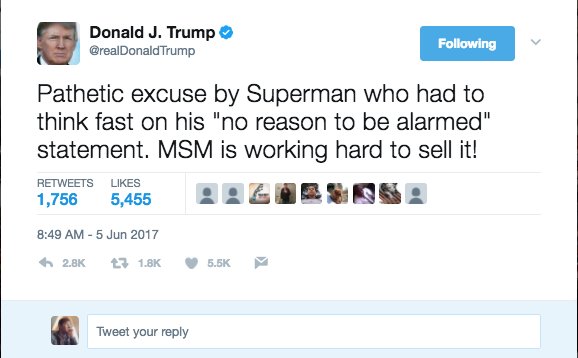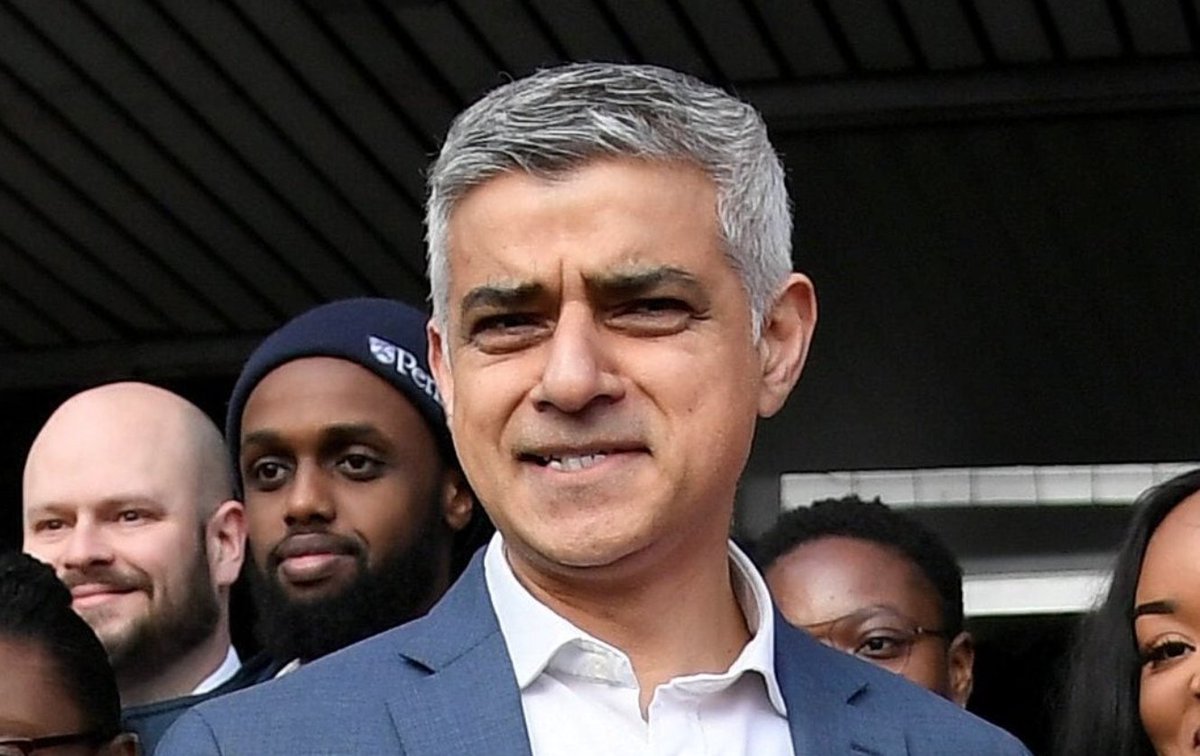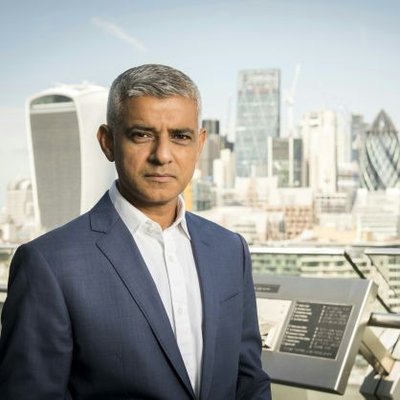Polling shows Sadiq Khan is set to secure a second term as London mayor on May 6. He is easily beating his Conservative rival, Shaun Bailey, who looks likely to suffer the worst defeat of a Tory candidate for the mayorality since the office was created more than 20 years ago. According to our latest poll with YouGov, Khan is currently leading Bailey by 47% to 26% on first preferences. In the final round, the current mayor would beat his rival by 66% to 34%.
The Mile End Institute (MEI) at Queen Mary University of London has been analysing the changing political landscape in the nation’s capital over the last four years through our regular polls. We’ve found that Khan’s political strengths are his perceived competence, the fact that his policy agenda resonates with the concerns of many Londoners, and the relative dominance of the Labour party in the capital.
Sadiq Aman Khan (/ s ə ˈ d iː k ˈ k ɑː n /; born 8 October 1970) is a British politician serving as Mayor of London since 2016. He previously was Member of Parliament (MP) for Tooting from 2005 until 2016. A member of the Labour Party, Khan is on the party's soft left and has been ideologically characterised as a social democrat.
In relation to performance in City Hall, the mayor has retained his net positive rating, with 45% saying he is doing well and 42% saying he is doing badly – although this has declined slightly since November, when 44% said he was doing well and 39% said badly. Indeed, voters believe that Khan’s handling of the pandemic has been reasonably effective, even though the mayor does not control the funding of the National Health Service; nor does he have legal powers through which to combat the spread of COVID-19.
Londoners have clear views about the priorities for the mayor if he is successfully elected for a second term. The poll results show that the top three concerns for public investment are the National Health Service (63%), housing (58%) and policing (42%).
- Sadiq Khan was an active participant in a Zoom family Seder held by Hampstead couple Noeleen and John Cohen. The London Mayor read several extracts from the Haggadah and spent more than an hour at.
- Now, Mayor of London Sadiq Khan, who’s currently campaigning to be re-elected on 6 May, has announced his 'pledges to refresh London’s strategy for tackling violence against women and girls.
- 5 hours ago 'Sadiq Khan has been our problem' Mayor of London confronted over rising knife crime SHAUN BAILEY hit out at Sadiq Khan as being at the heart.
When asked what would help to make London a more “liveable city”, respondents highlighted the top priorities as more affordable housing (56%), tackling anti-social behaviour (43%), improving air quality (30%), and building more homes for social rent (24%). Khan is emphasising his plan to support 170,000 green jobs and employment for young people but a higher priority for voters appears to be concerted action to tackle anti-social behaviour and crime on the city’s streets.
More controversial are plans for regulating car use in London. Low Traffic Neighbourhoods (LTNs) at the behest of London boroughs reduce the number of motor vehicles on residential streets. Over half of Londoners (52%) support them. However, when asked about expanding the congestion charge to cover Greater London, there was considerable disquiet, with 62% opposing an extension.
Delicate coalition
The incumbent mayor is advantaged by the Labour party’s strength in London. In the Greater London Authority elections that will take place alongside the mayoral race, 46% intend to vote Labour (down slightly from 50% in November 2020). Among 18- to 24-year-olds, Labour support rises to 67% and among black, Asian and multi-ethnic voters, Labour voting intention stands at 64%. Almost half (49%) the London middle-class say they support Labour.
But while Khan is on course for a solid victory, the challenge for him, and indeed the Labour party as a whole, is that they are relying on a relatively narrow electoral coalition to deliver that victory.
Khan is positioning himself as the “truly green candidate” in the race, solidifying his support among younger, liberal-leaning supporters. In doing so, however, there is a risk that he alienates other sources of traditional Labour support. For example, it is noticeable that voters over the age of 65, those living in the outer boroughs, and those who voted to leave the EU in the 2016 referendum are less likely to support Khan or Labour. Among the over-65s, Khan has a -29% rating for his performance as mayor. Middle-class Londoners give him a net favourability rating of 11%, whereas among working-class voters, the figure is -9%. Black, Asian and Multi-Ethnic voters (necessarily a diverse and complex grouping) generally rate him far more highly than white voters.
At his manifesto launch, Khan trumpeted his success in expanding cycling infrastructure during his tenure in City Hall. But older white voters appear less comfortable with the green agenda. Our survey found that voters over the age of 65 were overwhelmingly hostile to extending the congestion charge, with 80% saying they were against such a move. Opposition to Low Traffic Neighbourhoods was significantly greater amongst those who voted for Britain to leave the EU (51% were against; 36% were in favour), compared to those who voted remain (61% were in favour; 31% were against). Older voters wanted to see initiatives that tackle anti-social behaviour on London’s streets, while improving “quality of life”, such as cultivating more shops on local high streets.
The cultural cleavage between “progressive” and “conservative” voters, even within London, is firmly entrenched. We found that while 66% of Londoners over the age of 65 approve of a government plan to fly the union flag over government buildings, only 27% of young people (aged 18-24) do so. It will be a challenge for politicians, even those as adept as Khan, to address the divide in attitudes that now characterises London’s politics. Even so, the importance of cultural issues ought not to be overstated. Our survey shows that the core priorities in the capital that are under the mayor’s control remain jobs, housing and policing. It is on these issues that Khan will ultimately be judged in his second term.
Mayor Sadiq Khan surprised locked down Londoners with a divisive New Year display which used fireworks and drones to light up the night sky with the clenched fist symbol of Black Lives Matter.
Khan, whose term in office has been extended for a year without an election as a result of the Chinese virus pandemic, shared a clip of the display filmed by the BBC on social media with the #BlackLivesMatter hashtag
“The future holds unexposed danger but no stress, humankind is no stranger to progress, and as we’ve proven, when we collaborate, progress follows fast,” says a male voice in the clip, before the BLM fist is suddenly emblazoned across the sky above the Millenium Dome.

“This is one voice with one message: Black Lives Matter,” a female voice proclaims, as fireworks explode around the fist, which begins to multiply:
Our New Years Eve show just sent a loud, proud message to the world: London stands together against racism – tonight and always. #BlackLivesMatterpic.twitter.com/CQXZ4j9HfF

— Sadiq Khan (@SadiqKhan) January 1, 2021
The Labour politician’s highly partisan New Year illuminations may prove controversial for Britons who have been dismayed by the destructive and violent actions of the Marxist-led race movement’s supporters — generally conducted in defiance of otherwise ruthlessly enforced lockdown rules with little or no police interference, due to senior officers’ fear of the group.
In London alone, Black Lives Matter mobs have repeatedly defaced Sir Winston Churchill’s statue, attempted to burn the flag on the hallowed Cenotaph national war memorial and daubed it with graffiti on the anniversary of D-Day, and bloodied police officers and chased them through the streets shouting “run, piggy, run”.
One female officer was left with horrific injuries when she was knocked from her horse during disorder on Whitehall, near the Prime Minister’s official residence, suffering a collapsed lung, broken ribs, and a broken collarbone.
Exclusive Video: BLM Activist Says White Men Are ‘The Common Enemy’, ‘We Need to Get Rid of Them’ https://t.co/jdp2Cz3e85
— Breitbart London (@BreitbartLondon) July 21, 2020

Sadiq Khan Mayor Of London Twitter
The New Year fist display was accompanied by a snippet of music from rapper Michael Ebenezer Kwadjo Omari Owuo Jr — aka “Stormzy” — although the choice of lyrics was somewhat unusual:
Lord I’ve been broken
Although I’m not worthy
You fixed me, now I’m blinded
By your grace
You came and saved me
Stormzy, who denounced Britain as “definitely, 100 per cent” racist in 2019, was a perhaps deliberately provocative choice for inclusion in the festivities (such as they were, in a tier four lockdown), given his past history yelling “f*** the government, f*** Boris” while wearing a Union Jack stab vest during a performance in Glastonbury.

The rapper, raised by a single mother from Ghana, has been a dedicated race activist since well before the George Floyd unrest, providing funding for two black-only scholarships at the University of Cambridge, for example.
“If we weren’t oppressed, we wouldn’t be shouting,” declared the award-winning multi-millionaire last summer.
“[T]his is a real pain. This ain’t some sort of trend. This is real life and this has been our reality for hundreds, thousands of years,” he suggested, stretching the timeline for the oppression he alleges to a period millennia before Africa’s colonisation.
Sadiq Khan Twitter
UK City to Change Statues Which ‘Over-Celebrated Empire, Christianity and “Great” White Men’ https://t.co/8kzJPttm93
— Breitbart London (@BreitbartLondon) October 19, 2020
Follow Jack Montgomery on Twitter:@JackBMontgomery
Sadiq Khan Wife
Follow Breitbart London on Facebook:Breitbart London

Comments are closed.